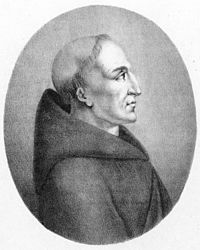


Francesco Antonio Vallotti
Source:
Wikipedia
It is during the Renaissance that commercial enterprise began its rise toward rivalry with royalty in terms of wealth and power, the Medici banking family in Italy an apt example. It was during the Baroque that early capitalism became the alternative to not being luckily born. Such as mining precious metals in the Americas and trading derivatives would lead from the economic scenario of a few rich whilst the most poor to a few rich whilst the most poor with some middle class (bourgeoisie) in the middle. Among the largest companies on the globe were in shipping, driving the colonial expansion of Europe. The British East India Company had been chartered in 1600 as The Company of Merchants of London Trading into the East Indies. That was three years after the staging of the first opera in 1597, Jacopo Peri's 'Dafne', and two years before Gulio Caccini published his work 'Le Nuove Musiche' ('The New Music') in 1602, the latter the year of the founding of the Dutch East India Company. That "new music" was baroque, to which opera would become both a major limb and the highly competitive business of theatre. Come the Dutch West India Company in 1623. The Portuguese East India Company had been formed as early as circa 1500 but was a royal monopoly until 1628. The burgeoning of commerce that preceded the Industrial Revolution, however, was not without gamble, evidenced by the South Sea Company Bubble of 1720 nine years after its founding. Howsoever, it was of commercial growth in Europe largely pushed by trade across the seas that during the Baroque musicians were able to seek patronage from other than royalty. Aristocrats weren't the only wealthy anymore and opera became itself a major commercial industry. Francesco Antonio Vallotti, however, availed himself of the original source of patronage in music that had been the Roman Catholic Church several centuries before such as kings became notable sponsors of music.
Born in Vercelli, Italy, on 11 June 1697, Vallotti wasn't a major composer, though he wrote a strong body of sacred music including psalms, hymns, responsorials and other liturgical works. Responsorial singing, between a cantor and congregation, had well preceded Jesus. It had been a Jewish development in singing the psalms of David [Jewish Music Resource Center]. Compare responsorial to antiphonal. Vallotti had been largely neglected by history until the publishing of his text on temperament in 1950 by G. Zanon. Though that has seen acknowledgement among professional musicians it didn't increase his audience a lot, such that Vallotti's remains an unfamiliar name.
Vallotti had become a Franciscan in 1716, then a priest in 1720. He assumed a position as organist at St. Antonio's in Padua in 1722, then maestro in 1730, which station he kept throughout his career for the next half century. Among his best-known compositions are his nine 'Lamentazioni per la Settimana Santa per voce e strumente' (Lamentations for Holy Week) authored from 1731-1743. Texts for these pieces are from the 'Book of Lamentations' concerning the destruction of Jerusalem in 586 BC by the King of Babylon, Nebuchadnezzar II. Though traditionally ascribed to the prophet, Jeremiah, 'Lamentations' is now thought to be a collection of anonymous authors.
'Lezione 1 per il Mercoledì Santo' Francesco Antonio Vallotti
For Holy Wednesday in D minor 1739
Ensemble Festa Rustica directed by Giorgio Matteoli Soprano: Rosita Frisani
'Lezione 2 per il Mercoledì Santo' Francesco Antonio Vallotti
For Holy Wednesday in F major 1743
Ensemble Festa Rustica directed by Giorgio Matteoli Tenor: Mario Nuvoli
'Lezione 3 per il Mercoledì Santo' Francesco Antonio Vallotti
For Holy Wednesday in B-flat major 1739
Ensemble Festa Rustica directed by Giorgio Matteoli Countertenor: Marco Lazzara
'Lezione 2 per il Giovedí Santo' Francesco Antonio Vallotti
For Holy Thursday (Maundy Thursday) in B minor 1732
Ensemble Festa Rustica directed by Giorgio Matteoli Soprano: Rosita Frisani
'Lezione 3 per il Giovedí Santo' Francesco Antonio Vallotti
For Holy Thursday (Maundy Thursday) in B-flat major 1732
Ensemble Festa Rustica directed by Giorgio Matteoli Soprano: Mario Nuvoli
'Lezioni 1-3 per il Venerdì Santo' Francesco Antonio Vallotti
For Holy Friday in G minor, G minor & C minor 1740/41/31
Ensemble Festa Rustica directed by Giorgio Matteoli Soprano: Rosita Frisani
Vallotti's best-known work is probably his treatise on temperament being the second volume of four in music theory addressing counterpoint, harmony and his system of tuning (temperament). The only of those which were published in Vallotti's lifetime was Book 1 titled 'Della scienza teorica, e pratica della moderna musica libro primo' in 1779. He died the next year on 10 January 1780. Books 2-4 of which the second addresses temperament didn't see print until 1950 in G. Zanon's 'Trattato della moderna musica'.
Sources & References for Economic Growth of Europe:
Oscar Gelderblom / Francesca Trivellato (The business history of the preindustrial world / 2018)
John H. Munro (Entrepreneurship in Early-Modern Europe (1450 - 1750) / University of Toronto / 2006)
Ernst Juerg Weber (A Short History of Derivative Security Markets / U of Western Australia / 2008) (alt)
Sea Trade:
British East India Company (founded 1600):
Qatar Digital Library Wikipedia
Dutch East India Company (founded 1602)
Dutch West India Company (founded 1621)
Portuguese East India Company (royally founded c 1500 / commercial charter 1628)
South Sea Company (Great Britain / founded 1711)
South Sea Company Bubble (1720):
Sources & References for Francesco Antonio Vallotti
VF History (notes)
Wikipedia English (including corpus categories)
Wikipedia French (including corpus categories)
Wikipedia Italian (including corpus categories)
Compositions: Centro Studi (149 pages)
Published works:
Della
scienza teorica, e pratica della moderna musica libro primo (1779):
Recordings:
Discogs
Scores:
CPDL
IMSLP
Musescore
Morgan Library
Musicalics
(vendor)
Vallotti Temperament
(Book 2 of Della scienza teorica, e
pratica della moderna musica):
Ross W. Duffin:
Baroque Ensemble Tuning Introduction
Why I hate Vallotti (or is it Young?)
Jacobs School of Music Intranet:
1/6 Comma
Cents Table
Bibliography:
Sven Hansell (Vallotti, Francesco Antonio / 2001)
Classical Main Menu Modern Recording
hmrproject (at) aol (dot) com